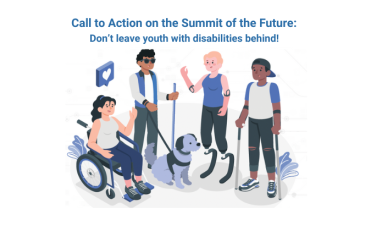A group of young persons with disabilities have created an action plan to make sure international development is inclusive for everyone.
The International Disability Alliance Youth Committee in collaboration with Equal World campaign and supported by the Stakeholder Group of Persons with Disabilities, have drawn up 10 demands of decision-makers to ensure the outcomes of the Summit of the Future meet the challenges humanity is collectively facing, particularly young people with disabilities in all their diversity.
This collaboration recognises that young people with disabilities and the organisations that represent them bring vital lived experiences and perspectives and have a role to play in deciding the future of our people and planet and these voices must be heard in the Pact for the Future.
Lydia Vlagsma, a member of the IDA Youth Committee said: “this is a clear call on world leaders: you must make an active effort to include young people with disabilities in your activity. Our voices must be heard on matters relating to our future. Without hearing us and taking action, progress on the SDGs will leave us behind”.
The Summit of the Future presents an important opportunity for all young people, particularly young people with disabilities, to have their say on what that future looks like and for their national and other world leaders to listen and act accordingly. The voices of young people with disabilities in the Pact for the Future negotiations is essential, including through their own national contributions.
In line with the chapters of the Pact for the Future, this collaborative group have outlined 10 demands of decision-makers below:
Sustainable development and financing for development (FfD)
Action 1: Advocate for inclusive policies in participatory development agendas
Action 2: Promote access to financial resources and entrepreneurship opportunities
Science, technology and innovation development
Action 3: Promote accessibility of infrastructure, physical spaces and technology for youth with disabilities and future generations.
Action 4: Promote research on assistive technologies and digital cooperation
International peace and security
Action 5: Ensure that all youth, and in particular girls with disabilities, are safe, protected and also have the opportunity to contribute to peace processes and reconstruction programmes
Action 6: Meaningful participation in conflict resolution and peacebuilding Processes, including youth with disabilities from underrepresented groups
Youth and future generations
Action 7: Support youth with disabilities to develop skills in leadership, advocacy, and negotiation techniques.
Action 8: Promote platforms of dialogue and engagement and empower youth with disabilities by giving them visibility around the world.
Transforming Global Governance
Action 9: Facilitate awareness of the rights of persons with disabilities, by further advocating for the representation of persons with disabilities in policies
Action 10: Involving youth with disabilities in decision-making processes and accountability mechanisms.
To learn more about the IDA Youth Committee, please contact Rosario Galarza at rgalarza [at] ida-secretariat.org
Read the full call to action
This story was originally published on sightsavers.org.
Find the article here.
